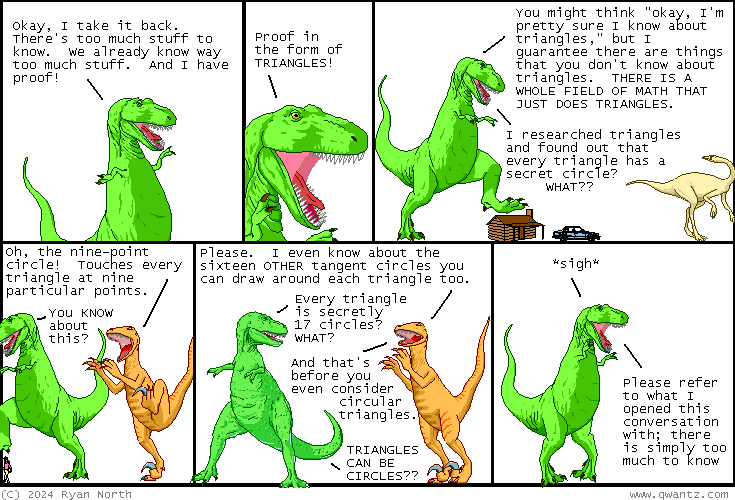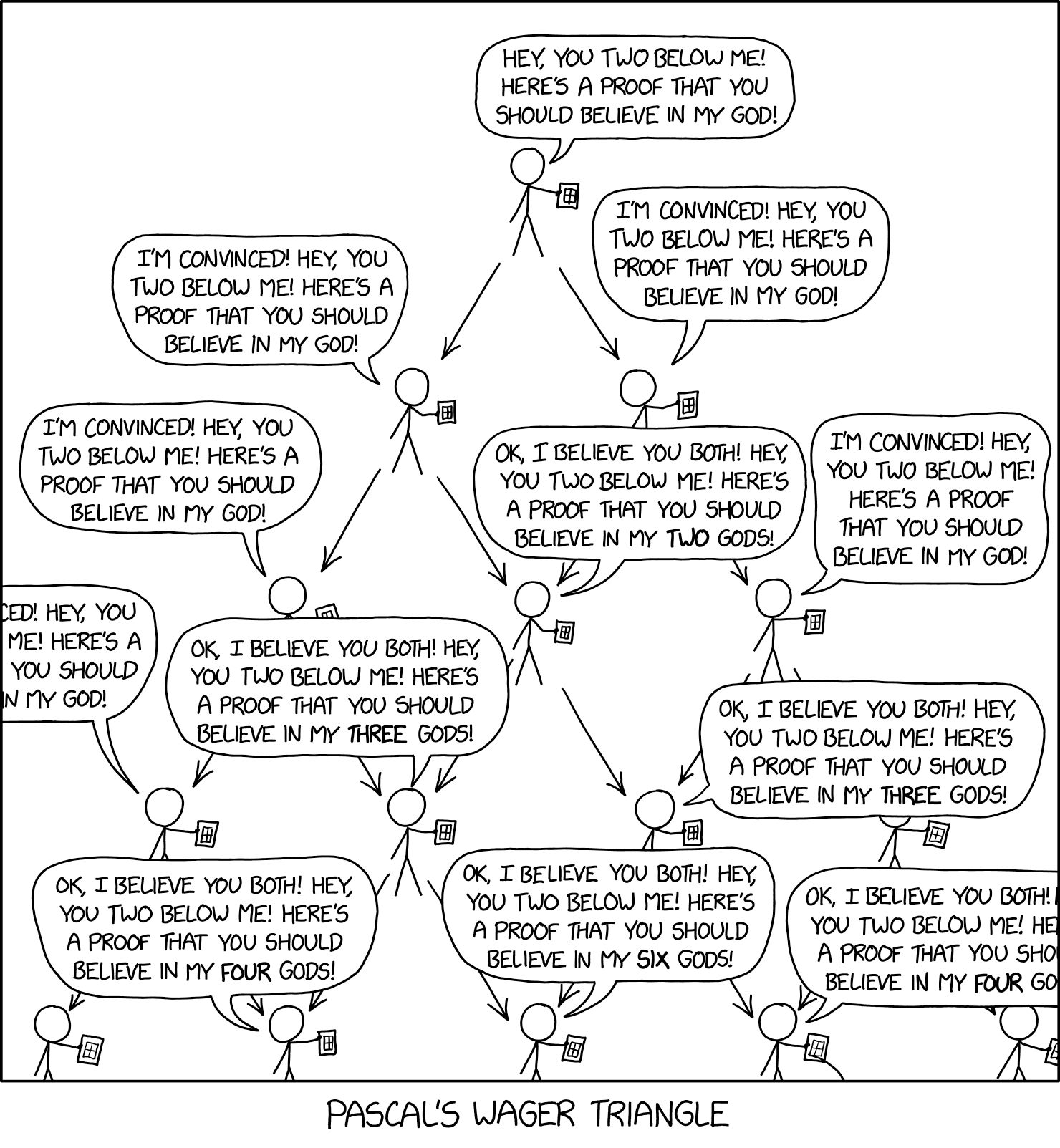Mathematical synchronicity in the comics
« previous post | next post »
(…with a bit of philosophy and psychiatry in the mix…)
Dinosaur Comics for 6/17/2024:

The same day's xkcd — "Pascal's Wager Triangle":

The Dinosaur Comics mouseover title: "triangles can be several KINDS of circles; for the sake of the public peace i daren't say more".
Wikipedia on the nine-point circle:
The nine-point circle is also known as Feuerbach's circle (after Karl Wilhelm Feuerbach), Euler's circle (after Leonhard Euler), Terquem's circle (after Olry Terquem), the six-points circle, the twelve-points circle, the n-point circle, the medioscribed circle, the mid circle or the circum-midcircle. Its center is the nine-point center of the triangle.
The xkcd mouseover title: "In contrast to Pascal's Wager Triangle, Pascal's Triangle Wager argues that maybe God wants you to draw a triangle of numbers where each one is the sum of the two numbers above it, so you probably should, just in case."
Wikipedia on Pascal's Triangle:
In mathematics, Pascal's triangle is an infinite triangular array of the binomial coefficients which play a crucial role in probability theory, combinatorics, and algebra. In much of the Western world, it is named after the French mathematician Blaise Pascal, although other mathematicians studied it centuries before him in Persia, India, China, Germany, and Italy.
Pascal's wager is a philosophical argument advanced by Blaise Pascal (1623–1662), seventeenth-century French mathematician, philosopher, physicist, and theologian.This argument posits that individuals essentially engage in a life-defining gamble regarding the belief in the existence of God.
Synchronicity (German: Synchronizität) is a concept introduced by analytical psychologist Carl Jung "to describe circumstances that appear meaningfully related yet lack a causal connection". Synchronicity experiences refer to one's subjective experience whereby coincidences between events in one's mind and the outside world may be causally unrelated, yet have another unknown connection. Jung held this was a healthy function of the mind, that can become harmful within psychosis.
rosie said,
June 21, 2024 @ 12:05 am
On 8 Jun Mathologer had posted a video with another cheerful fact about triangles:
https://www.youtube.com/watch?v=WLAW5yz5O3E&t=312s
Philip Taylor said,
June 21, 2024 @ 3:58 am
I confess that I have only just skimmed the Wikipedia article on Pascal's Wager (immediately before posting this comment) but it seems to me that it assumes that one has to believe in God if one is ever to end up in Heaven. But if there were (?is?) a God, and if He were/is a just and caring God, why would He care whether or not someone had believed in Him during that person's lifetime ? Even allowing for the possibility that such a God might be willing to banish an unrepentant sinner to Hell for all Eternity, would He also not be willing to admit non-sinners to Heaven whether or not they had believed in Him ?
Berna said,
June 21, 2024 @ 5:00 am
@Philip Taylor Yes, and what about all the *other* gods one could believe in? If believing in one is even a decision you can make (which to me it isn't, I can no more believe in any gods than I could believe the sky is green, even if I wanted to), there are lots and lots of gods; and you have to choose, because many of them are mutually exclusive.
Benjamin E. Orsatti said,
June 21, 2024 @ 7:35 am
Using formal logic to evangelize is kinda like eating soup with a fork (which is likely why Franciscans win more converts than Jesuits (!)). Faith and reason are perfectly compatible (see, e.g., St. Bonaventure https://plato.stanford.edu/entries/bonaventure/), but you can't "use" formal logic to "prove" (or disprove, for that matter) the reality of deontologically and supernaturally revealed religion.
Nobody can ever "explain" to me why I should believe any more than I can explain to my cat what I do when I leave the house every morning or why he can't have another can of soft food today or why I am not as appreciative as he'd like of the lower half of a bunny he'd left for me in the kitchen. Intellectually, I understand the Trinity _almost_ like I understand a 4D hypersphere — imperfectly, by analogy, relationally, etc. The difference is that I can get a _better_ understanding of a 4D hypersphere by learning more math(s), whereas, in lieu of math, it is faith that allows me to understand the Trinity. Catholics believe that the sources of faith are Scripture, Tradition (i.e. the writings of the Saints), Magisterium (i.e. Papal teaching), and personal revelation (to the extent it doesn't conflict with the primary 3 sources).
But the punchline is that the _reason_ why you can't prove faith through logic _is_ something that can be proven logically. It's the same as the solution to the problem of evil. An all-knowing, all-powerful, all-good G-d can only permit Earthly suffering if the potential for suffering is _better_ for humanity than living in an Earthly Paradise (cf. Leibniz). Similarly, Faith (along with the theological virtues of Hope and Charity/Love) is a "muscle" that must be "exercised" here on Earth if we are to be strong enough to force open the gates of Heaven. If you could write out for me a logical, mathematical "proof" for revealed religion, what would be the point of living on Earth at all — might as well be living it up in Heaven with the Angels!
Or, put in a way more congenial to Prof. Mair, "The Tao that can be named…".
Stephen Goranson said,
June 21, 2024 @ 9:53 am
Kurt Gödel, even after his incompleteness theorems, reportedly remained a theist.
M. Paul Shore said,
June 21, 2024 @ 5:25 pm
A great-great-half-uncle of mine, Harry Clinton Gossard (1884-1954), was an American mathematician and academic administrator who circa 1916 discovered an internal triangle point that’s classified under the sometimes-misleading (from what I understand) rubric of “triangle centers”. (It’s been alleged that this point had previously been discovered by someone named Zeeman, but the statements I’ve seen in support of that claim are far from satisfactory.) Almost half a century after Prof. Gossard’s death, the point he’d discovered underwent further study and at that time was named the “Gossard perspector”. I was impressed by this accomplishment of my uncle’s, but I had no choice but to pull back a bit on my admiration when I learned that the online Encylopedia of Triangle Centers currently lists more than 60,000 such “centers”, with a theoretically infinite number more to be identified. At least my uncle’s is #402.